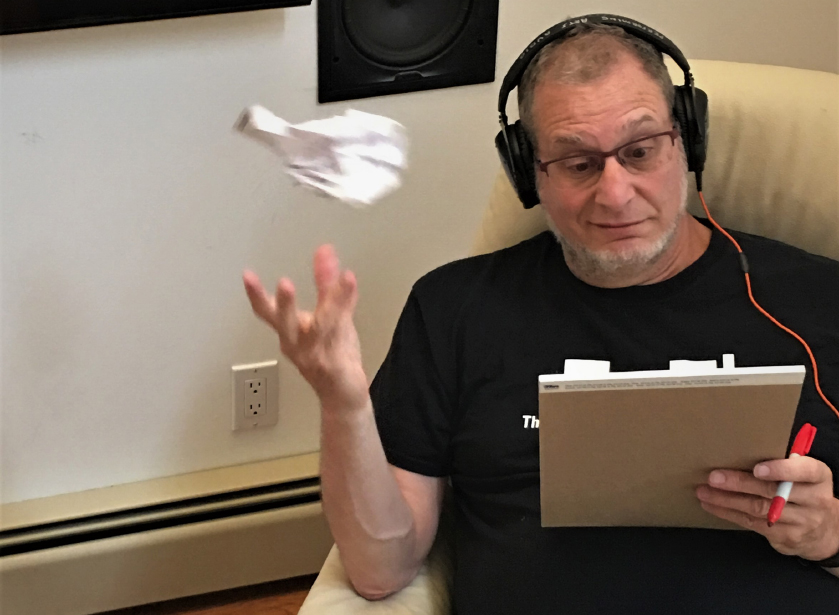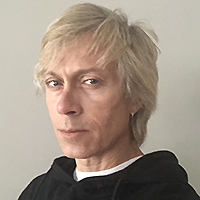When Ben Stiegler, CEO of Performing Arts Audio, describes how his fascination for all things audio and for technology, in general, was nurtured early on, he says, “Thinking back, there were people who were really kind to me when I was small and curious and socially shy, but technically fearless…”
As an example, he continues: “I’d get home from elementary school and call Western Electric Labs outside Chicago, asking them questions. I was trying to figure out how the phone network worked. One day, I came home from school and there was a cardboard box by the back door with a note saying, ‘For Ben. From your friends at Western Electric.’ Inside were parts for constructing a two-location private line intercom. That was fourth grade, 1964, I think.”
Around the same time, he adds, his bedroom became the neighborhood radio repair shop. His love of music and audio started well before that, however. “In the womb, probably. My mom always had classical radio on, and when I was a toddler, my happiest place in the world was right in front of my grandparents’ hi-fi; it was my heaven. Sound’s always been something I’m sensitive to.”
In elementary school, he was the “AV guy,” he continues, who wanted to record the school’s holiday concerts because it allowed him to use a tape recorder. In his teens, Stiegler landed an internship as a product tester at [the then-named] Shure Brothers, field-testing “the awesome state-of-the-art ‘Vocal Master’ towers.”
In fact, being technically fearless led to many of his early audio gigs – experiences he describes with obvious fondness: “A friend’s mom was the chair of the Evanston, Illinois Republican Club. So we’d get hired to put speakers up in trees for their annual summer picnic. I remember being built into a 4th of July float one year – it was probably 100 degrees in there – and this same friend wasn’t a techie.
“But he was a business-minded guy, so he got us a gig doing all of the AV for a Christian Science regional gathering. I don’t know how they let non-union minors in there, but I got to rent a video projector the size of a small refrigerator. So, he was on camera. I was mixing sound, and we earned a thousand bucks – it was like hog heaven, right?”
Later, Stiegler started recording graduate music school recitals at Northwestern University. “I looked in the Yellow Pages for audio and recording companies, hoping for a job. One was Brewster Records, run by a high school music teacher who did recordings on the side. When I called him, his wife was about to deliver a baby, so he said, ‘Maybe I could use you.’ I got the recurring gig. I’d bicycle over to Northwestern, put up two Neumann condenser mics, load a 10.5-inch pancake of tape on the ReVox and enjoy the recitals. People trusting me with all this responsibility and equipment – again, hog heaven.”
He was also classically trained in voice and French Horn, but the horn went in the closet shortly after he started college because, even then, he had a lot going on: running audio for the theater department, working at the school’s radio station, and on software for the Auditory Physiology Lab at Northwestern University to expand his understanding of how our brains process sound.
Since he’s worn multiple hats in the concert sound, recording, and IT industries, as a systems designer, consultant, engineer/mixer, educator, and IT specialist, among other things, living, as he puts it, “at the crossroads of physics, auditory physiology research, music, and sound engineering.” His current focus is on Performing Arts Audio, designing and tuning performance systems and room acoustics, and solving the “knotty problems” that come along with doing so. Still, he continues to cast a wide net professionally from his home base in the San Francisco Bay Area.
An Independent Approach
Stiegler and I covered a lot of ground during our conversation – a meeting he’s labeled “Tales From The Crypt” during which he displayed an offbeat and irrepressible sense of humor when discussing the highs, lows, and dangers of his fiercely independent approach to problem-solving. “I have done a couple of things that weren’t well thought out which could have ended in my demise, and was saved a couple of times,” he laughs. “So I must have had some angels looking after me.
“Once, I was locked in my campus radio station at 4 am behind a 4-inch thick acoustic door with a deadbolt on it (because who knows who is roaming around at that time) and noticed the 220-volt power outlet for the AM transmitter was loose in the wall. I decided to tighten it up. So I’m leaning back against a metal table, and on that table is a UPI news teleprinter with a phone line that’s grounded. So, all this 220 is going through my body. I can’t let go. I’m convulsing, shaking, but again – angels, super strength – somehow I managed to get my hand away.”

Then there was the time, as a teen, when he convinced his synagogue to allow him to improve the sound system with an additional column loudspeaker – a job he characteristically felt he could take on alone. He was 20 feet up on an extension ladder with the loudspeaker winched up on a ladder rung. Trying to lift the column over his head to place it, the ladder started going over backward. “I’m juggling all this weight above a linoleum over concrete floor, and I’m tipping backwards. But I grabbed a ledge and held on for dear life. Eventually I managed to secure the speaker. There were no rigging classes back then, so how people learned was the hard way.”
A popular refrain throughout his childhood was his parents’ admonition: ‘Don’t push that button.’ They also firmly discouraged him from pursuing anything related to audio or media. “My parents were born in the U.S., but my grandparents emigrated in the 1910s. And what are you supposed to do as the firstborn in a Jewish family – doctor or lawyer – right? They would not let me go to film school, and I wasn’t strong enough at that time to say, ‘Well, I’m going anyway.’”
Instead, Stiegler studied Biology/Physics at Carleton College and later Computer Science/AI/Human Factors Engineering and Psychology at the University of Minnesota. He continued to pursue his audio and production loves. “Carleton had a cutting-edge theatre in the round with a custom, probably experimental quadraphonic sound reinforcement system that needed a lot of regular attention. I was always hauling an oscilloscope up the tight spiral stairs to the sound booth, resetting linearity on the op-amp modules in that console.
Carleton’s radio station had been carrier current when he arrived, and it fell to him as chief engineer to manage the migration to low-power FM broadcasting. With a lot of help from Minnesota Public Radio and a local RF wizard, he got it done. After graduation he helped a nascent Minneapolis community FM station, KFAI Fresh Air, get on air. “When I visited, the staff was trying to make sense of donated radio equipment. They had all been hired on a CETA job-training grant – there was no pro audio expertise in the group. They eagerly let me take over and soon we were on the air. This project, he says, “was important to me because it was my first community outside of college, where I mattered.”
The station often did broadcasts from Walker Church – “a hotbed of like civil rights and social activism” – and Stiegler also landed a gig mixing at The Cedar Cultural Center for artists including Pete Seeger, Jim Post, and others, which eventually led to volunteer work at The Winnipeg and Minnesota Folk Festivals.
New Challenges
After earning an MA in Psychology, Stiegler relocated to the Bay Area to attend the California Institute of Integral Studies and work as a child and family therapist. After several years, however, he found himself looking for new challenges and pivoting to working with technology, founding SynerTel, a telecom and IT system integration business. He describes his first year as a business owner as a “rollicking” time; “It was kind of my MBA of the streets, where I gained the confidence to sell. I had no idea that you needed to mark things up to cover fixed costs, but I learned. Within a few years, we were installing phone systems and networks all over the country, but I was also doing music and theatre audio, venue lighting, video, etc., on nights and weekends.”
SynerTel and the early incarnation of Performing Arts Audio existed in parallel until Stiegler sold SynerTel in the mid-2010s, leaving him free to indulge in hands-on audio/video work. That let him leave behind hiring and managing staff, he says. “Now I have all these interesting and fun projects, clients that I love, and I get to support them and travel regionally.” Among them, he cites working with five venues at Camp Tawonga, Jewish summer camp near Yosemite National Park (completed in 2023) and projects leveraging QSC’s Q-SYS audio, video, and control platform.

Stiegler points to a Q-SYS install at the multi-room East Bay Community Foundation as one “complicated but wonderful” project. “I also just finished an audio upgrade/replacement for a local church that’s also a concert venue. It was audio mud city in there,” he says. An overly live 120-degree wide space with multiple non-delayed, 40-year old loudspeakers halfway up the aisle pointing sideways that he replaced with an EAW steerable column array.
Prior to the pandemic, he still did some business service and coaching, smaller IT gigs, and, in addition to running Performing Arts Audio, taught audio and theatre production technologies at a local high school. “That was really fun. Unfortunately, the pandemic put an end to my regular gig at the school. But I have been teaching a class called ‘Audio for Musicians’ as a fundraising auction item for Living Jazz, which runs Jazz Camp West and provides a ton of music education in local schools.”
The changes at that time also led him to branch out from commercial AV into building and designing Smart Home systems. “I’ve been doing that since 6 to 8 months into the pandemic, which is a counterbalance to commercial AV’s larger and longer sales cycle.”
Shifting Focus
With age has come a bit of an effort to dial back his urges to improve media experiences wherever he sees or hears a problem. “I have a bit of a reputation, which I do try to dial back – for being at concerts where things are falling apart and going over to the mix position, offering, ‘Hey, do you want some help?’” The answer is often an enthusiastic “yes”: “I remember this really fine Klezmer ensemble that toured out of Toronto in the 80s. They were playing a big gig in the Twin Cities.” The engineer was clearly struggling, and the sound was obviously suffering. “That’s one of the memorable times when I just couldn’t stand it, and the guy said, ‘Yes, please take over.’
“I started producing concerts back in Minneapolis, renting as much stuff as I could jam in my Pinto. One gig was presenting Theodore Bikel. But as I’ve gotten older and my bedtime has receded, my focus has shifted to installed systems.” He quotes a fellow audio company owner who once said the business is ‘95 percent moving company and 5 percent audio and art.’ “It’s still hard work,” he adds, “but it’s not ‘let’s see if you can crack another vertebrae’ hard. And it’s very fulfilling.

“One of my promises to myself when I sold SynerTel was no more employees. I was not a great boss. I imagined everybody was like me – motivated to keep at things till they worked – but it didn’t always work out that way. Instead, I have a couple of electricians, a resource for doing cabling, and a construction firm that’s good at getting heavy stuff to stay up in the air safely. I don’t even call them subcontractors – I call them allies.”
The approach allows him to continue to challenge himself professionally while leaving some time and bandwidth to challenge himself musically as well: “A friend of mine started a Klezmer Jazz fusion ensemble at one of the synagogues in Berkeley. And for years, he said, ‘You don’t have to practice. Just come and see if you like it.’ Finally, I went, and I was like, ‘Oh, I’ve missed this playing with others.’ I’d never had to improvise or solo before. In classical music, it was ‘don’t mess with it. Follow the score.’ So, (playing with) people who are like, ‘we don’t care what it sounds like. It’s your turn; take a solo, see how it goes, learn from it,’ it’s a gift.
“I also play in the Awesome Orchestra Collective here – the Bay Area’s adventure-seeking orchestra. One of my Carleton classmates (the noted film sound engineer John Sims) wrote a symphony recently as an homage to the Black neighborhood where he grew up in St. Paul, which was bulldozed to make room for freeways in the name of urban renewal. The same thing happened here in Oakland, too. I arranged for our orchestra to premiere a movement of his symphony and John was with us for the performance.”
That and his work with young people, coupled with obvious gratitude and memories of those who were kind to him in fostering his fascination with all things audio and science early on, seem part of an effort to pay it forward. But perhaps it’s more accurate to say Stiegler does what he does, personally and professionally, as much for the joy of it as for any other reason.
“It’s not like it feels like a debt. It’s fun. It’s fulfilling. Maybe that’s part of becoming an elder,” he says, laughing, “My daughter’s 25, and my son is 21. There were a lot of times when listening to dad wasn’t particularly enjoyable for either party, but other people’s kids, it’s like, they want to learn from me? That’s neat.
“I’m conscious that I’ve got, hopefully, 20 or 25 more years of enjoying life,” he concludes. “Being a workaholic was a survival strategy. Now, life is a little different. I don’t have to be running all the time. It’s OK to go to the beach, swim, hang out with my sweetie (a symphony-level horn player) and visit my kids and friends.”















